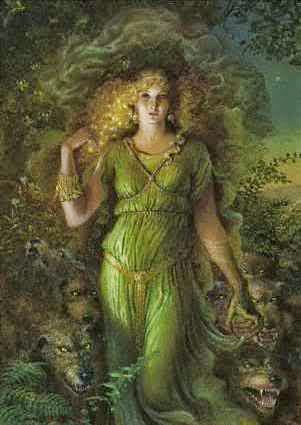Celtic War Goddesses
Although the (Celtic) Irish gods are warriors, and there are special war-gods, yet war-goddesses are more prominent, usually as a group of three—Morrigan, Neman, and Macha. A fourth, Badb, sometimes takes the place of one of these, or is identical with Morrigan, or her name, like that of Morrigan, may be generic. Badb means "a scald-crow," under which form the war-goddesses appeared, probably because these birds were seen near the slain. She is also called Badbcatha, "battle-Badb," and is thus the equivalent of -athubodua, or, more probably, Cathubodua, mentioned in an inscription from Haute-Savoie, while this, as well as personal names like Boduogenos, shows that a goddess Bodua was known to the Gauls. The badb or battle-crow is associated with the Fomorian Tethra, but Badb herself is consort of a war-god Nét, one of the Tuatha Dé Danann, who may be the equivalent of Neton, mentioned in Spanish inscriptions and equated with Mars. Elsewhere Neman is Nét's consort, and she may be the Nemetona of inscriptions, e.g.at Bath, the consort of Mars. Cormac calls Nét and Neman "a venomous couple," which we may well believe them to have been.To Macha were devoted the heads of slain enemies, "Macha's mast," but she, according to the annalists, was slain at Mag-tured, though she reappears in the Cúchulainn saga as the Macha whose ill-treatment led to the "debility" of the Ulstermen. The name Morrigan may mean "great queen," though Dr. Stokes, {72}connecting mor with the same syllable in "Fomorian," explains it as "nightmare-queen."She works great harm to the Fomorians at Mag-tured, and afterwards proclaims the victory to the hills, rivers, and fairy-hosts, uttering also a prophecy of the evils to come at the end of time. She reappears prominently in the Cúchulainn saga, hostile to the hero because he rejects her love, yet aiding the hosts of Ulster and the Brown Bull, and in the end trying to prevent the hero's death.
Although the (Celtic) Irish gods are warriors, and there are special war-gods, yet war-goddesses are more prominent, usually as a group of three—Morrigan, Neman, and Macha. A fourth, Badb, sometimes takes the place of one of these, or is identical with Morrigan, or her name, like that of Morrigan, may be generic. Badb means "a scald-crow," under which form the war-goddesses appeared, probably because these birds were seen near the slain. She is also called Badbcatha, "battle-Badb," and is thus the equivalent of -athubodua, or, more probably, Cathubodua, mentioned in an inscription from Haute-Savoie, while this, as well as personal names like Boduogenos, shows that a goddess Bodua was known to the Gauls. The badb or battle-crow is associated with the Fomorian Tethra, but Badb herself is consort of a war-god Nét, one of the Tuatha Dé Danann, who may be the equivalent of Neton, mentioned in Spanish inscriptions and equated with Mars. Elsewhere Neman is Nét's consort, and she may be the Nemetona of inscriptions, e.g.at Bath, the consort of Mars. Cormac calls Nét and Neman "a venomous couple," which we may well believe them to have been.To Macha were devoted the heads of slain enemies, "Macha's mast," but she, according to the annalists, was slain at Mag-tured, though she reappears in the Cúchulainn saga as the Macha whose ill-treatment led to the "debility" of the Ulstermen. The name Morrigan may mean "great queen," though Dr. Stokes, {72}connecting mor with the same syllable in "Fomorian," explains it as "nightmare-queen."She works great harm to the Fomorians at Mag-tured, and afterwards proclaims the victory to the hills, rivers, and fairy-hosts, uttering also a prophecy of the evils to come at the end of time. She reappears prominently in the Cúchulainn saga, hostile to the hero because he rejects her love, yet aiding the hosts of Ulster and the Brown Bull, and in the end trying to prevent the hero's death.

